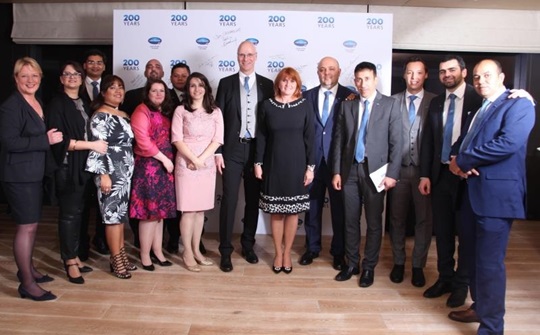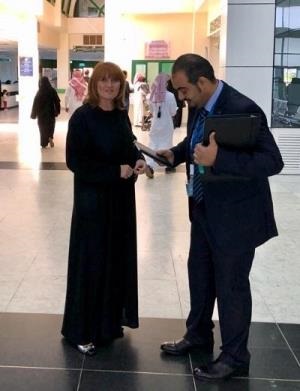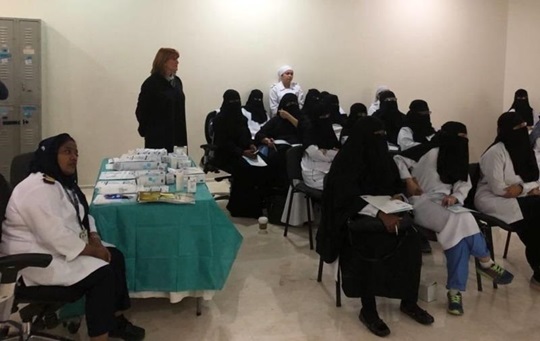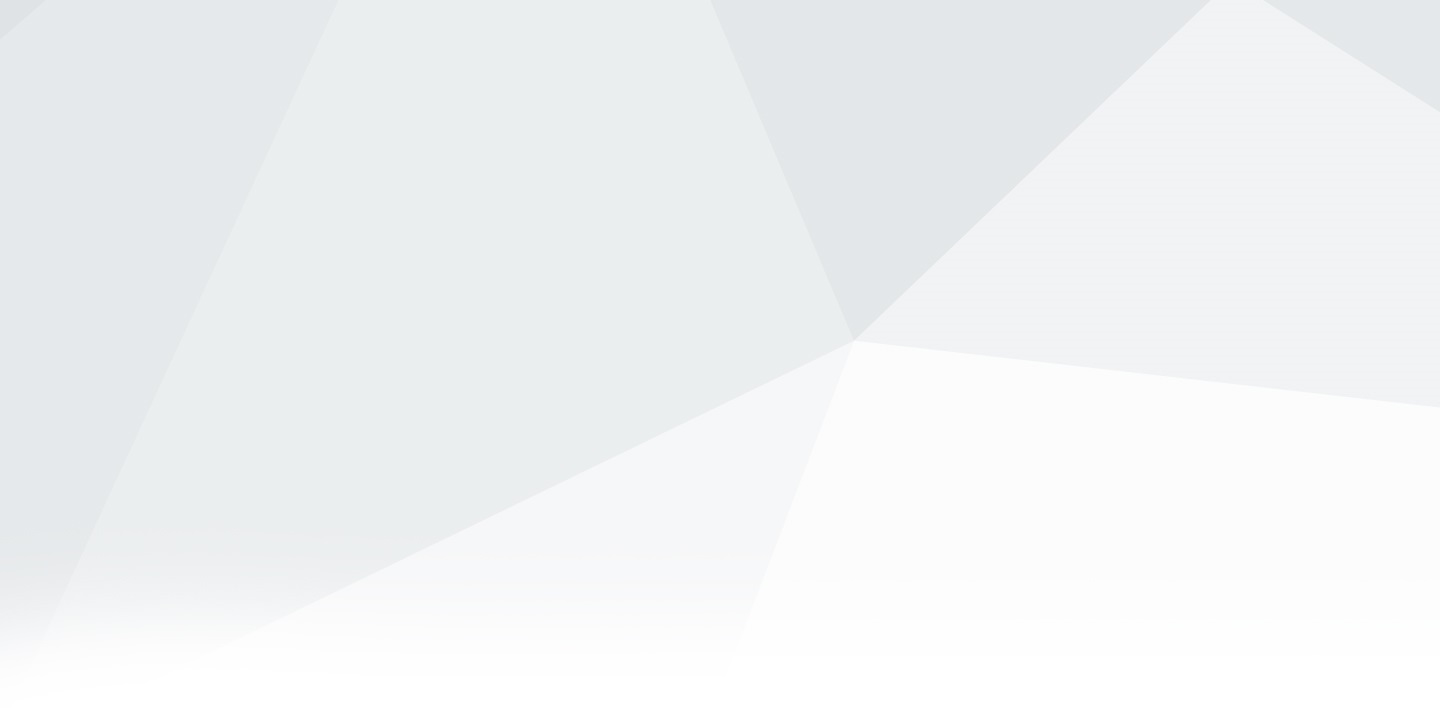What is it like working in the healthcare sector in the Middle East as a woman? We asked Cristina Popp, who is going further for HARTMANN in Dubai.
When Cristina Popp arrives at her office in Dubai on Sunday, she’s never sure what the coming week will bring. Wait, Sunday? That’s right. In much of the Middle East, the workweek goes from Sunday to Thursday – a slight difference with how business is done in the West. Interestingly, it may also be one of the few common factors that unite the business styles of the Middle East countries. Otherwise, business cultures widely vary. As Cristina says, “Don’t generalize about the Middle East, and don’t believe everything you hear in the media!”

Never a dull day in Dubai
Cristina’s office consists of six men and five women, representing seven different nationalities: Syrian, Egyptian, Lebanese, Filipino, Palestinian, German – and Cristina is Romanian. She came to Dubai as Managing Director of HARTMANN Middle East two years ago after working six years as the Managing Director at HARTMANN Romania. The main attraction of Dubai was the chance to grow and challenge herself in a new business environment.
Dubai hasn’t disappointed. Analysts describe the region as a “VUCA” market: volatile, uncertain, complex and ambiguous. Cristina explains, “Volatile due to oil prices, uncertain due to political upheaval, complex because every country has different business legislation and different values, and ambiguous as you can’t always wait for all the data to make a decision.” Something happens every day: a new local regulation, a complaint from an end-user, a political crisis, or a container blocked in customs. “You have to be the solution provider, figuring out challenges as they arise – no matter what the bump in the road is.”

The female factor
Cristina is often asked how women in the workplace are treated in the Middle East. There’s no easy answer. “It’s a complex combination of aspects like region (e.g. Jordan vs. Saudi Arabia), family traditions, exposure to other cultures (e.g. Dubai vs. Riyadh), and social class.” For example, when travelling to Saudi Arabia she wears the Abaya (long black dress). However, in places like UAE and Kuwait, where an international influence can be felt, Cristina meets many other women in managerial positions in government, hospitals and clinics, and companies. Cristina adds, “Even in Saudi Arabia, things are starting to change. Encouraged by the government, companies are looking more and more to employ women.”
Healthcare booming
The healthcare industry in the Middle East will grow 28% by 2030. Because of longer life expectancy and an increase in wealthier lifestyles, chronic diseases like obesity and diabetes are also on the rise. HARTMANN has been pleased to play a role in contributing to the burgeoning healthcare services industry.
The key to further growth is fostering partnerships. Again, there is no one solution that fits all of the Middle East. “You must always evaluate the size of the distributor, cultural aspects and their vision,” says Cristina. “Plus, some people don’t separate their professional and personal lives. Business revolves around relationships, family ties and trust.” It demands knowledge of the local markets and values to turn a friendly meeting into a firm commitment.
Cristina is often asked how women in the workplace are treated in the Middle East. There’s no easy answer. “It’s a complex combination of aspects like region (e.g. Jordan vs. Saudi Arabia), family traditions, exposure to other cultures (e.g. Dubai vs. Riyadh), and social class.” For example, when travelling to Saudi Arabia she wears the Abaya (long black dress). However, in places like UAE and Kuwait, where an international influence can be felt, Cristina meets many other women in managerial positions in government, hospitals and clinics, and companies. Cristina adds, “Even in Saudi Arabia, things are starting to change. Encouraged by the government, companies are looking more and more to employ women.”
Healthcare booming
The healthcare industry in the Middle East will grow 28% by 2030. Because of longer life expectancy and an increase in wealthier lifestyles, chronic diseases like obesity and diabetes are also on the rise. HARTMANN has been pleased to play a role in contributing to the burgeoning healthcare services industry.
The key to further growth is fostering partnerships. Again, there is no one solution that fits all of the Middle East. “You must always evaluate the size of the distributor, cultural aspects and their vision,” says Cristina. “Plus, some people don’t separate their professional and personal lives. Business revolves around relationships, family ties and trust.” It demands knowledge of the local markets and values to turn a friendly meeting into a firm commitment.

Talking about health and healthcare
People often shy away from talking with someone outside of the family, and sometimes exhibit an almost fatalistic attitude towards poor health. Plus, many product-users send the family driver to purchase items like diapers. “It’s hard to measure how many users received the key message. So, we plan outreach activities. For example, we handed out samples of skin care foam in pharmacies to open a dialogue about adult diapers.” Conditions affecting under-40s, like hypertension, are easier to address, as younger people are more open to sharing via the Internet and social media channels.
Dubai: All work and then play
On the weekends, Cristina hits the Dubai Opera House or walks through the old Dubai town with friends. In summer, when temperatures reach the 50-degree mark, and you miss being outside, she seeks refuge in southern Oman. “There, it’s only 30 degrees (C) and pleasant to be outside,” says Cristina. Any other boxes she would like to tick? “I would love to speak Arabic,” Cristina says. We certainly think she’s up to the task!
People often shy away from talking with someone outside of the family, and sometimes exhibit an almost fatalistic attitude towards poor health. Plus, many product-users send the family driver to purchase items like diapers. “It’s hard to measure how many users received the key message. So, we plan outreach activities. For example, we handed out samples of skin care foam in pharmacies to open a dialogue about adult diapers.” Conditions affecting under-40s, like hypertension, are easier to address, as younger people are more open to sharing via the Internet and social media channels.
Dubai: All work and then play
On the weekends, Cristina hits the Dubai Opera House or walks through the old Dubai town with friends. In summer, when temperatures reach the 50-degree mark, and you miss being outside, she seeks refuge in southern Oman. “There, it’s only 30 degrees (C) and pleasant to be outside,” says Cristina. Any other boxes she would like to tick? “I would love to speak Arabic,” Cristina says. We certainly think she’s up to the task!
2018 marks HARTMANN’s 200-year anniversary.
To commemorate this milestone, we have put together this series of articles. In it we show how our employees and partners contribute to advancing healthcare, as well as discussing trends and issues that affect the healthcare systems we serve.
